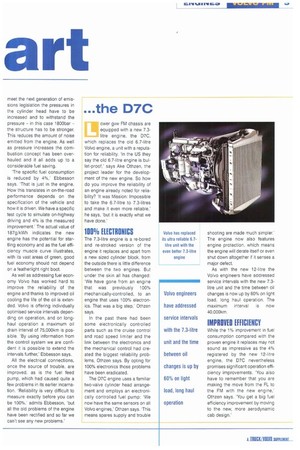D7C
Page 105

If you've noticed an error in this article please click here to report it so we can fix it.
ower gvw FM chassis are equipped with a new 7.3 litre engine, the D7C, which replaces the old 6.7-litre Volvo engine, a unit with a reputation for reliability. 'In the US they say the old 6.7-litre engine is bullet-proof,' says Ake Othzen, the project leader for the development of the new engine. So how do you improve the reliability of an engine already noted for reliability? It was Mission: Impossible to take the 6.7-litre to 7.3-litres and make it even more reliable,' he says, but it is exactly what we have done.'
110% ELECTRONICS
The 7.3-litre engine is a re-bored and re-stroked version of the engine it replaces and apart from a new sized cylinder block, from the outside there is little difference between the two engines. But under the skin all has changed: 'We have gone from an engine that was previously 100% mechanically-controlled, to an engine that uses 100% electronics. That was a big step,' Othzen says.
In the past there had been some electronically controlled parts such as the cruise control and road speed limiter and the Ink between the electronics and the mechanical control had created the biggest reliability problems, Othzen says. By opting for 100% electronics those problems have been eradicated.
The D7C engine uses a familiar two-valve cylinder head arrangement and employs an electronically controlled fuel pump: 'We now have the same sensors on all Volvo engines,' Othzen says, 'This means spares supply and trouble shooting are made much simpler,' The engine now also features engine protection, which means the engine will derate itself or even shut down altogether if it senses a major defect.
As with the new 12-litre the Volvo engineers have addressed service intervals with the new 7.3litre unit and the time between oil changes is now up by 60% on light load, long haul operation. The maximum interval is now 40,000km.
IMPROVED EFFICIENCY
While the 1% improvement in fuel consumption compared with the proven engine it replaces may not sound as impressive as the 4% registered by the new 12-litre engine, the D7C nevertheless promises significant operation efficiency improvements. 'You also have to remember that you are making the move from the FL to the FM with the new engine,' Othzen says. 'You get a big fuel efficiency improvement by moving to the new, more aerodynamic cab design,'
















































































































